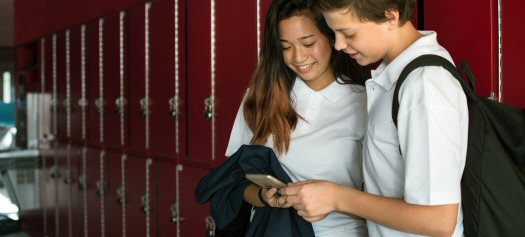 We've seen text messaging take on a number of practical
roles in secondary and post-secondary education, but
did you know it can be used to bolster the education
even of young children? More specifically, a text messaging
program founded by Stanford University researchers may
offer a means of improving literacy in low-income children. We've seen text messaging take on a number of practical
roles in secondary and post-secondary education, but
did you know it can be used to bolster the education
even of young children? More specifically, a text messaging
program founded by Stanford University researchers may
offer a means of improving literacy in low-income children.
Susanna Loeb and Ben York, researchers at Stanford's
Center for Education Policy Analysis, aim to address
a problem known as the "word gap." By the age of four,
children of low-income families hear about 30 million
fewer words than their higher-income counterparts. This
issue is easily understood when one considers that the
amount of quality time children can have with their
caregivers depends in large part on how much time parents
can afford to take off work to be with children, what
sort of resources parents can afford to invest in for
their children's education, and what sort of care parents
can afford for their children while they have to work.
Importantly, because this word gap emerges before even
the early age of four, low-income children are at a
disadvantage before they even reach public schools,
which are zoned and funded in a way that the education
of children from low-income families is already often
more poorly funded than that of children from higher-income
communities. Clearly, low-income youth face many unfair
hindrances in their education--but what can we do to
begin to level the playing field?
Loeb and York turned to text messaging for an answer.
With text messaging holding great popularity as a mode
of communication across social class, SMS is a promising
medium by which to reach low-income parents. Loeb and
York developed a program called Ready4K!, which sends
text messages three times weekly to subscribers offering
tips to improve children's literacy in the time the
parents have with their children. The texts started
with simple tips and gradually moved to more advanced
recommendations, and the topics they covered were periodically
reintroduced for reinforcement.
The researchers ran a pilot of their program with more
than 500 San Francisco families in 2014, with half of
the families receiving three weekly texts for the year,
and half of the families comprising a control condition
that received only texts containing standard school-related
announcements, such as reminders of vaccine requirements.
The children of participating families were tested at
the end of the study period, without their parents'
knowing in advance that they would be tested.
The test results spoke clearly: the children whose
families received the educational text messages performed
as though they had gained an extra two to three months
in the classroom over the children whose families did
not get the texts. Also of note is that these improvements
were even stronger in children of Black and Latino families,
who face greater marginalization and also among whom
texting is most popular.
The success of Ready4K! comes in large part from the
convenience and reach of text messaging as a medium.
Many similar initiatives involve attending lengthy training
sessions, which may be a strain for low-income families
to attend in the first place, and after which many simply
return to their old routines by habit, failing to make
the recommended changes. Text messaging, however, offers
a quick and easy way to reach people and can bring the
training into the home, breaking the barrier between
home and school. The design of Ready4K! also uses text
messages to break training into small, discrete pieces
that are easy to enact immediately, making people more
likely to actually follow the tips they are offered.
While Ready4K! stands as a promising initiative and
offers further evidence for the power of texting to
bolster education where it is most needed, it is important
to consider the other factors at play in the study.
The families that received the text messages were also
part of a larger program endeavoring to improve literacy
that provided them with reading materials. One roadblock
that many low-income families face in their children's
education is access to reading materials, so Loeb and
York's study may not perfectly reflect the efficacy
of Ready4K! in more typical conditions.
With this in mind, however, it is sure that Ready4K!
is a powerful and promising model. Even if our excitement
should be cautious and measured, excitement is warranted;
the potential text messaging holds to improve education
from young ages and address inequality is indeed great,
and surely something to be explored in future research
and development.
About the Author -
Sharon Housley is the VP of Marketing for NotePage,
Inc. a software company for communication software solutions.
http://www.notepage.net
|
